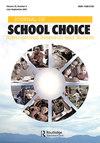Demystifying Goliath: An Examination of the Political Compass of Education Reform
Q2 Social Sciences
引用次数: 2
Abstract
ABSTRACT There are competing popular beliefs about whether education reform is a fundamentally bipartisan or conservative movement. Yet, despite the popularity of these prevariling depictions, there has been minimal effort expended toward systematically observing the political beliefs of the key players in the education reform movement. I gauge the political compass of education reform by administering anonymous political surveys to individuals affiliated with the two largest educational philanthropies and the nation’s largest convening of education policy scholars. Overall, I observe that, contrary to both popular competing characterizations of education reform, education reformers-those who receive philanthropic support to execute reform and those who produce education research to guide reform – overwhelmingly align with the Democratic Party and progressive political positions. The revealed political homogeneity of education reform indicates that it might be fertile terrain for groupthink to flourish. Implications and potential remedies are discussed.揭开巨人的神秘面纱:教育改革政治指南针的考察
摘要关于教育改革是一场根本上的两党运动还是保守运动,人们有着相互竞争的普遍看法。然而,尽管这些浮夸的描述很受欢迎,但在系统地观察教育改革运动中关键人物的政治信仰方面却花费了很少的精力。我通过对隶属于两个最大的教育慈善机构和全国最大的教育政策学者会议的个人进行匿名政治调查,来衡量教育改革的政治方向。总的来说,我观察到,与教育改革的流行竞争特征相反,教育改革者——那些获得慈善支持以实施改革的人和那些进行教育研究以指导改革的人——绝大多数都与民主党和进步政治立场一致。教育改革的政治同质性表明,这可能是群体思维蓬勃发展的沃土。讨论了影响和潜在的补救措施。
本文章由计算机程序翻译,如有差异,请以英文原文为准。
求助全文
约1分钟内获得全文
求助全文

 求助内容:
求助内容: 应助结果提醒方式:
应助结果提醒方式:


